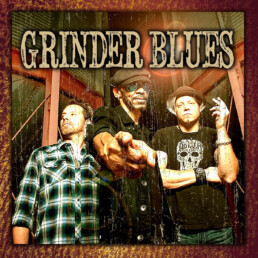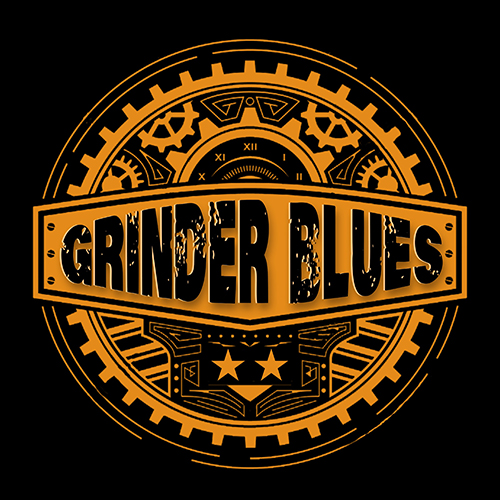
GRINDER BLUES’ HARD ROCKING DEBUT ALBUM TEAMS KING’S X LEGEND dUg PINNICK WITH EMMY AWARD WINNING ROOTS MUSIC MVP’S THE BIHLMAN BROTHERS
Trio’s high-energy performances, bone-crushing sound and from-the-gut songwriting put a fresh, contemporary spin on the blues tradition
Powerhouse trio Grinder Blues’ new album, called simply Grinder Blues, is like a shot of adrenaline to the heart of the genre. Its 10 original, high-voltage songs sizzle with daredevil virtuosity and rock with unrestrained energy, blasting a sound minted in the urban canyons of Chicago and the swamps of rural Louisiana during the 1950s into the present thanks to rumbling guitars, freight train rhythms and bass legend dUg Pinnick’s virtuoso licks and elegantly gritty rock ‘n’ soul voice.
The fast-paced disc opens with fireworks. Drummer Scot Little Bihlman’s supercharged shuffle lays the foundation for a slippery lockstep guitar-and-bass riff shared by Jabo Bihlman and Pinnick, kick-starting “Don’t Come Home.” As the song, a counterpoint to the old blues trope “baby, please come home,” unfolds, it dives from clenched-fist immediacy into open-palmed psychedelia, then shifts back to overdrive for a thunderous finale.
“The idea for the music was to stay away from the clichés and rock out,” dUg explains. “If we felt like we were heading into any songs that seemed like standard blues lyrically or musically, we made it a point to veer in the opposite direction.”
There’s ample evidence of that throughout Grinder Blues. In the insanely catchy “Burn the Bridge,” Jabo’s proto-metal guitar hook sinks deep into the tune’s one-chord framework and the trio’s chanting vocal harmonies spotlight the hypnotic groove. And the song “Train” is a galloping juggernaut that barely stays on the rails as dUg spins the true story of his step-grandfather’s demise by a speeding locomotive. The tune is set, of course, to an infectious, rampaging train beat.
“We wanted every song to have something you could latch onto immediately,” Jabo says, “so we started with grooves that people know from the blues — shuffles, train beats, flat fours — and then made them huge. After that, all the rules were thrown out, really taking things outside the box.” To ensure big-bellied tones and maximum heaviness, Jabo and dUg tuned their instruments’ strings down one-and-a-half steps to C standard tuning.
The maverick blues-rock supergroup chased inspiration’s tail as they recorded live at the Palms Studio in Las Vegas with producer Miles Fulwider, who was an integral part of the project. “There were times when we had almost no idea where we were going,” relates Scot. “We’d lock into a groove and at the place where Jabo and me might normally change like we would in a regular 12-bar blues, dUg would yell ‘keep going.’ The session became like a Jackson Pollock painting, with us splashing musical ideas on canvas.”
Despite the serious chops at work in Grinder Blues, Pinnick says the project’s core philosophy was simply “to have fun. We wanted every song to be fun to play and fun to hear, because we spend so much time in our other bands writing songs in our blood, tearing pages from our soul, concentrating on every part being perfect. What Grinder Blues and King’s X have in common is pushing the envelope. What’s different is that Grinder Blues is all about letting things fly — even little mistakes — and having a good time.”
The alliance of Pinnick and the Bihlmans — who are both major King’s X fans — started at a cookout in Hollywood, where Scot met dUg. Soon the conversation turned to music production for film and TV, an arena where the multiple Emmy Award winning Bihlman’s thrive. Their credits range from such big screen fare as Love N’ Dancing to the FX network’s hit series Sons of Anarchy. Within months Jabo, Scot and dUg were composing for movies and television together. Their chemistry made forming a trio and recording Grinder Blues a natural step.
Originally from northern Indiana’s Chicagoland, Jabo and Scot have a long history in blues and rock. They’ve made four albums with their Bihlman Brothers band including Sweet Tooth and Day By Day, which were cut with Grammy-winning producer Jim Gaines at Memphis’ legendary Ardent Studios, and toured behind Son Seals and other blues legends. The Bihlman Brothers have appeared on stage with a diverse list of stars ranging from B.B King to Ted Nugent to Kid Rock, testifying to the diverse appeal of their music. Scot and Jabo — who were signed to a song publishing deal with Warner/Chappell Music — are also in-demand session musicians, music educators and authors of how-to music instructional books.
Although dUg grew up just outside of Chicago, Grinder Blues is his first project in the genre. His grandmother, who was a strict Baptist, raised him. So dUg’s first musical passion was gospel — with R&B, Motown and rock on its heels. dUg has been the frontman of the spiritually probing, steel-edged progressive rock outfit King’s X since its inception in 1980 and has developed a reputation as one of rock’s most venerated bassists over the course of more than 20 King’s X albums, four solo discs and many, many tours.
Despite his long history on rock’s cutting edge, dUg says his singing on Grinder Blues is his most natural and soulful. The low C standard tuning he and Jabo employed encouraged dUg to explore the lower end of his register. He also had time to craft his vocal lines at home after the initial sessions for the album, allowing him to hone his performances at a relaxed and studied pace.
“I believe I’ve found myself as a singer with this album,” dUg offers. “In the past, I’ve always had a tendency to push myself to the top of my range, or to get in and work through my weaknesses in the studio until I got past them. This time, because Grinder Blues is all about having fun, I just relaxed and played to my strengths, and found that being in my comfort zone gave me more flexibility.”
As for Jabo and Scot, the thrill of being in a band with dUg is “how an Elvis fan would feel forming a band with Elvis,” Jabo relates. “And the fact that we’re all on the same page is so cool it’s almost unbelievable.
“We’re trying to push the boundaries of a genre that can be stale if you’re not careful,” he continues. “But we’ve got the right blend of chops, energy and love for the blues to really breathe some fire into it.”

